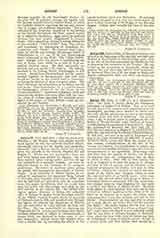

Adrian II, POPE (867-872).—After the death of St. Nicholas I, the Roman clergy and people elected, much against his will, the venerable Cardinal Adrian, universally beloved for his charity and amiability, descended from a Roman family which had already given two pontiffs to the Church, Stephen III and Sergius II. Adrian was now seventy-five years old, and twice before had refused the dignity. He had been married before taking orders, and his old age was saddened by a domestic tragedy. As pope, he followed closely in the footsteps of his energetic predecessor. He strove to maintain peace among the greedy and incompetent descendants of Charlemagne. In an interview at Monte Cassino he admitted to communion the repentant King Lothair of Lorraine, after exacting from him a public oath that he had held no intercourse with his concubine since the pope’s prohibition, that he would take back his lawful wife Theutberga, and abide by the final decision of the Roman See. He upheld with vigour against Hincmar of Reims the unlimited right of bishops to appeal to the Sovereign Pontiff. At the Eighth General Council, which he convened at Constantinople in 869, and presided over through ten legates, he effected the deposition of Photius and the restoration of unity between the East and the West. He was unsuccessful in retaining the Bulgarians for the western patriarchate; that nation unwisely determined to adhere to Constantinople, a course which was destined to bring upon it ruin and stagnation. Adrian saved the western Slays from a similar fate by seconding the efforts of the saintly brothers, Cyril and Methodius. Of enduring influence, for good or evil, was the endorsement he gave to their rendering of the liturgy in the Slavonic tongue. Adrian died towards the close of the year 872.
JAMES F. LOUGHLIN

